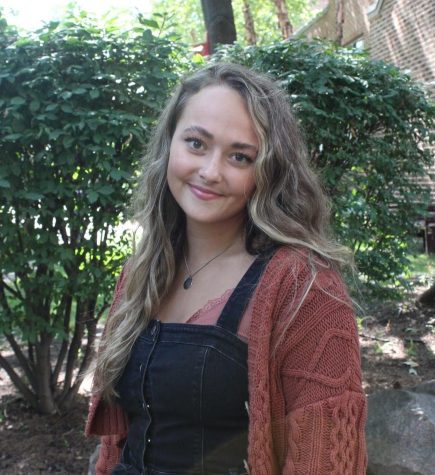Student weighs quality of life over self-objectification
February 3, 2023
Erie, Pa, January 31, 2023—Every season, the monster of body image issues seems to creep in to our vulnerable minds — uninvited. Despite what some media influencers may force upon us, this negative relationship with the way we view ourselves won’t be fixed by a new regimen of green drinks, collagen powders, workout routines or dieting fads.
Personally, I’ve tried it all. And no matter what diet-culture trend I fall into, and no matter how much progress I make or don’t, I still am stuck in a never-ending pattern of self-hatred and objectification.
Sure, exercise can be a great release of serotonin and dopamine for your mind and body. And eating a healthy meal or taking a supplement is good fuel for your body. But what the beauty Mongols won’t tell you is that regardless of the kind of foods and health powders you put in your body or how much time you spend on the Stairmaster, the way you feel about yourself won’t change until you do some real workout — on your brain.
My struggle with body image has lasted as long as I can remember. I still remember remarks from other parents during youth soccer, when I was 5-years-old, about how my body was built for gymnastics.
An intended compliment, but remarks like this are taken in by a developing, malleable mind and these comments seep into ones psyche. They affects how a young person sees themselves These sorts comments affected my negative body image — my legs, my athletic build, that I still can’t seem to shake.
I read an interesting book recently in another attempt to dismantle the negative thoughts I have built up about myself over the last two decades. “More Than a Body” by twins Lexie and Lindsay Kite, really helped reframe my thinking and understanding of where these kinds of thoughts come from.
The authors revealed a term that I have just recently added to my vocabulary: self-objectification. They loosely define this as perceiving yourself as someone to be viewed rather than simply living in your body.
The twins describe this state of being as splitting yourself in two: the viewer and the viewed.
“Your quality of life and well-being are at stake when your identity is split in two. When you live as the surveyor and the surveyed, the watched and the watched, you come to believe you are your body and you are defined by your looks. You evaluate yourself accordingly” Kite said.
In my case this is all true. When I feel low self-esteem creeping in, it often has nothing to do with me. It has more to do with my fear of being “viewed” by others.
“But what if someone sees my cellulite at the pool?”
“Will a guy ask me to dance if he sees my full belly hanging over my shorts if they aren’t perfectly hiked up?”
“What if my hair gets frizzy and I look like a mess?”
Yes, what if?
I’ve started to evaluate these types of thoughts by giving them a dose of reality. We are our own worst critics, and the things we are so worried others will see about us likely never cross their minds.
Even if they do, cellulite is natural. It’s healthy to have a full belly, especially on a night out with friends. It’s normal, especially for girls with curly hair, to develop a little frizz. That shows the world I enjoyed my day outside or danced like crazy with my friends.
In the thick of the “clean-girl” aesthetic and this year’s diet and exercise trends, I encourage you to live in your body rather than living for your body to be viewed — by yourself or others. Whenever I find myself wrapped up in degrading thoughts about my body, my outfit or my eating habits for the day, I try to reframe my mind to enjoy being alive. I want to view myself from the inside-out.
“I’m really glad my strong legs help me swim.”
“I am so blessed to have had a good meal and full stomach.”
“I love my curls!”
It’s easier said than done, but even this small shift away from self-objectification helps you stop being your harshest critic.
If you haven’t picked a New Year resolution yet, or your goal for the year seems to benefit the onlooker rather than your own view – consider what thoughts you allow to frame your body image narrative, your reality. Work toward bringing your fears back down to earth. View yourself from the inside-out and not as an object to be judged by others.
You can find, “More Than a Body” by twins Lexie and Lindsay Kite on Amazon and in most bookstores.




